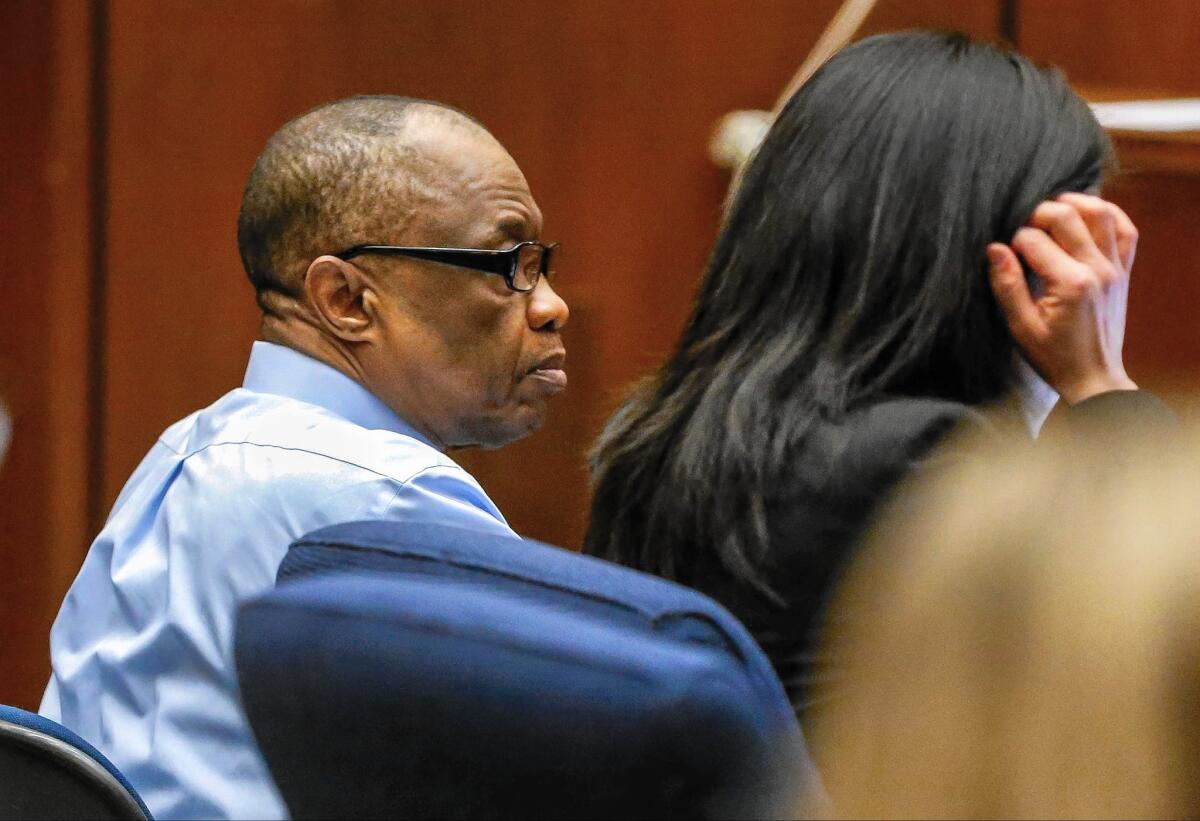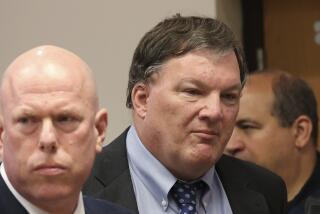Defense grills L.A. County coroner in ‘Grim Sleeper’ trial

- Share via
An attorney for the man accused of murdering 10 young women over a period of decades in South Los Angeles tried Thursday to poke holes in the work conducted by the county’s chief medical examiner, who reviewed autopsy reports of the grisly slayings.
Questions about the autopsies were raised as testimony continued in the trial of Lonnie Franklin Jr., who prosecutors allege is responsible for a series of murders committed by a serial killer dubbed the Grim Sleeper.
Franklin faces 10 counts of murder in the killings of nine women and a 15-year-old girl spanning more than 20 years. He also faces one count of attempted murder.
Franklin, 63, has pleaded not guilty.
For a third day in the downtown Los Angeles courtroom, family members were subjected to the gruesome coroner’s photos of their loved ones and detailed discussion of their fatal injuries, prompting some to walk out of the courtroom.
Besides the gentle tapping of his feet, Franklin sat still, rarely glancing toward the witnesses or to the photos of victims projected on a screen next to him.
Defense attorney Seymour Amster grilled Los Angeles County Medical Examiner-Coroner Mark Fajardo about his analysis of autopsy reports of some of the victims, beginning with Debra Jackson, a 29-year-old waitress who was discovered in 1985 shot in the chest in an alley. She is believed to be the serial killer’s first victim.
On Wednesday, Fajardo testified that he had reviewed autopsies conducted by medical examiners who have since died or are unable to testify.
Amster’s questioning focused on whether Fajardo could be certain in his analysis without personally conducting the autopsies, and whether the documents he reviewed were properly maintained and corresponded correctly to the victims.
For instance, Amster asked if Fajardo had any way to confirm that the medical examiner who conducted an autopsy verified the identity of the body by toe tag. In some cases, that information was written in a report. In others, it was not, Fajardo said.
Fajardo, who has been county coroner since 2013, repeatedly stated that he could only rely on the documentation and photographs provided to him.
Under questioning from Deputy Dist. Atty. Beth Silverman, Fajardo said that it’s common for the coroner’s office to have representatives testify about the work of their current and former colleagues.
The office is the largest and busiest in the country with 28 doctors performing 9,000 autopsies a year; it’s not always possible for the deputy medical examiner who conducted an autopsy to testify about his or her work, he said.
There was no evidence in his reviews that any of the bodies were misidentified, and documents related to each of the cases had the correct, unique identification number, he told the court.
On Wednesday, guided by Silverman through decades-old documents, Fajardo testified that seven of the victims died from gunshot wounds to the chest, one was strangled and another suffered both strangulation and gunshot wounds.
Fajardo also testified that the trajectory of the bullets was consistent with the victims sitting in the passenger seat of a vehicle while their assailant sat in the driver’s seat. That is the method Silverman has alleged Franklin used in the killings.
Jurors briefly heard testimony from Antonio Lorca, a retired coroner’s investigator for the county, who recounted arriving at an alley near Gage and Vermont avenues on the morning of Aug. 10, 1984.
There he saw the decomposing body of a woman sprawled on her back under a red carpet, he said. He could find no identification on the woman, so he called the coroner’s office and was told she would be marked as Jane Doe 59, the 59th unidentified female body found in the county that year.
She would eventually be identified as Debra Jackson.
Lorca is expected to resume testimony on Friday.
Twitter: @sjceasar
ALSO
College student killed by train may have been distracted by his cellphone
Family of man killed in Pomona shooting sues ex-LAPD officer and L.A.
Man charged in brutal attack on fan at Dodger Stadium last year
More to Read
Sign up for Essential California
The most important California stories and recommendations in your inbox every morning.
You may occasionally receive promotional content from the Los Angeles Times.











